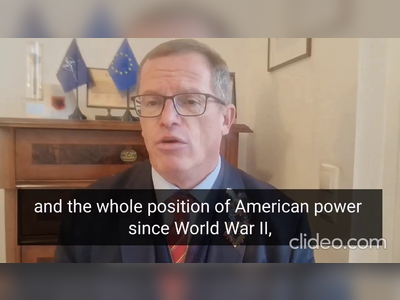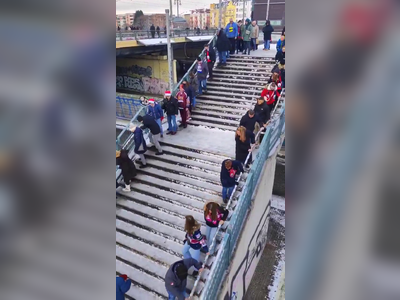
Italian Prisons Facing Alarming Rise in Inmate Suicides
A crisis unfolds as overcrowded prisons witness a surge in suicide rates, raising human rights concerns
Italy’s prison system is grappling with an alarming rise in suicides, with eight inmates taking their own lives within the first two weeks of the new year, a stark increase compared to previous years.
The situation has drawn both national and international attention to the enduring challenges within the Italian penal system, exacerbated by chronic overcrowding, insufficient resources, and systemic neglect.
Reports indicate that the suicide rate behind bars is averaging one every two days, a distressing fact underscored by the inclusion of 'suspicious deaths' that further boost this grim statistic.
The current figures are in stark contrast to the same period last year, where only three incidents were recorded, and even more so to just a single case two years ago.
Mario Serio, a prominent voice from the National Guarantor for the Rights of Persons Deprived of Liberty, emphasized the severity of the situation, warning that the continuation of this trend could see the numbers of 2024 double, a year during which Italian prisons witnessed 83 suicides and 18 suspicious cases.
"This is merely the tip of the iceberg," Serio noted, pointing to widespread distress and suffering throughout Italy's prison facilities.
Compounding the tragedy is the acute issue of overcrowding.
As of December 16, 2024, the prison system was operating at an average capacity of 132.6%, housing 62,153 inmates against an actual capacity of approximately 47,000.
Some institutions report even more severe overcrowding, such as Milan San Vittore at 225% and Brescia Canton Monbello at 205%.
Despite legislative attempts like the recent 'empty-prisons law,' these measures have failed to alleviate the pressure.
A significant number of prisons, 59 to be precise, continue to operate with over 150% of their capacity.
These overcrowded facilities often lack adequate staff, projects, and services, making them inhospitable spaces for rehabilitation.
The tragic pattern of suicides is prevalent across the country, from Rome and Florence to Cagliari and Bologna.
The timeframe saw a series of heart-wrenching incidents, beginning with a 37-year-old Moldovan man, tragically coinciding with President Sergio Mattarella’s New Year address, in which he decried the 'unacceptable conditions' in Italian prisons.
Less than 24 hours later, another incident occurred in Bologna.
One particularly troubling case involved a 25-year-old Egyptian detainee in Florence, who had a history of self-harm and was known to be at risk.
Despite previous attempts on his life, measures to prevent such an outcome were evidently inadequate.
In a grim revelation, two suicides occurred in the same facility within a week, highlighting the urgency of the crisis.
These deaths reflect a systemic failure in addressing mental health issues and ensuring adequate measures to protect vulnerable individuals.
Amid this crisis, the Italian government, under Prime Minister Giorgia Meloni, has opted against implementing amnesty or pardon measures.
Instead, the administration is focusing efforts on new prison infrastructure projects, with impending security legislation sparking fears of further criminalization within the system.
Pope Francis, advocating for the humane treatment of prisoners, has called for 'forms of amnesty' or 'sentence adjustments' to restore dignity and public trust, an appeal that has yet to influence government policy.
Meanwhile, Justice Minister Carlo Nordio has proposed building housing complexes for foreigners without fixed residences, sparking further debate over Italy’s approach to penal reform.
The ongoing situation reflects the deep-rooted challenges facing the Italian penal system, highlighting the urgent need for comprehensive reform and international scrutiny on human rights grounds.
The situation has drawn both national and international attention to the enduring challenges within the Italian penal system, exacerbated by chronic overcrowding, insufficient resources, and systemic neglect.
Reports indicate that the suicide rate behind bars is averaging one every two days, a distressing fact underscored by the inclusion of 'suspicious deaths' that further boost this grim statistic.
The current figures are in stark contrast to the same period last year, where only three incidents were recorded, and even more so to just a single case two years ago.
Mario Serio, a prominent voice from the National Guarantor for the Rights of Persons Deprived of Liberty, emphasized the severity of the situation, warning that the continuation of this trend could see the numbers of 2024 double, a year during which Italian prisons witnessed 83 suicides and 18 suspicious cases.
"This is merely the tip of the iceberg," Serio noted, pointing to widespread distress and suffering throughout Italy's prison facilities.
Compounding the tragedy is the acute issue of overcrowding.
As of December 16, 2024, the prison system was operating at an average capacity of 132.6%, housing 62,153 inmates against an actual capacity of approximately 47,000.
Some institutions report even more severe overcrowding, such as Milan San Vittore at 225% and Brescia Canton Monbello at 205%.
Despite legislative attempts like the recent 'empty-prisons law,' these measures have failed to alleviate the pressure.
A significant number of prisons, 59 to be precise, continue to operate with over 150% of their capacity.
These overcrowded facilities often lack adequate staff, projects, and services, making them inhospitable spaces for rehabilitation.
The tragic pattern of suicides is prevalent across the country, from Rome and Florence to Cagliari and Bologna.
The timeframe saw a series of heart-wrenching incidents, beginning with a 37-year-old Moldovan man, tragically coinciding with President Sergio Mattarella’s New Year address, in which he decried the 'unacceptable conditions' in Italian prisons.
Less than 24 hours later, another incident occurred in Bologna.
One particularly troubling case involved a 25-year-old Egyptian detainee in Florence, who had a history of self-harm and was known to be at risk.
Despite previous attempts on his life, measures to prevent such an outcome were evidently inadequate.
In a grim revelation, two suicides occurred in the same facility within a week, highlighting the urgency of the crisis.
These deaths reflect a systemic failure in addressing mental health issues and ensuring adequate measures to protect vulnerable individuals.
Amid this crisis, the Italian government, under Prime Minister Giorgia Meloni, has opted against implementing amnesty or pardon measures.
Instead, the administration is focusing efforts on new prison infrastructure projects, with impending security legislation sparking fears of further criminalization within the system.
Pope Francis, advocating for the humane treatment of prisoners, has called for 'forms of amnesty' or 'sentence adjustments' to restore dignity and public trust, an appeal that has yet to influence government policy.
Meanwhile, Justice Minister Carlo Nordio has proposed building housing complexes for foreigners without fixed residences, sparking further debate over Italy’s approach to penal reform.
The ongoing situation reflects the deep-rooted challenges facing the Italian penal system, highlighting the urgent need for comprehensive reform and international scrutiny on human rights grounds.
Translation:
Translated by AI
AI Disclaimer: An advanced artificial intelligence (AI) system generated the content of this page on its own. This innovative technology conducts extensive research from a variety of reliable sources, performs rigorous fact-checking and verification, cleans up and balances biased or manipulated content, and presents a minimal factual summary that is just enough yet essential for you to function as an informed and educated citizen. Please keep in mind, however, that this system is an evolving technology, and as a result, the article may contain accidental inaccuracies or errors. We urge you to help us improve our site by reporting any inaccuracies you find using the "Contact Us" link at the bottom of this page. Your helpful feedback helps us improve our system and deliver more precise content. When you find an article of interest here, please look for the full and extensive coverage of this topic in traditional news sources, as they are written by professional journalists that we try to support, not replace. We appreciate your understanding and assistance.











